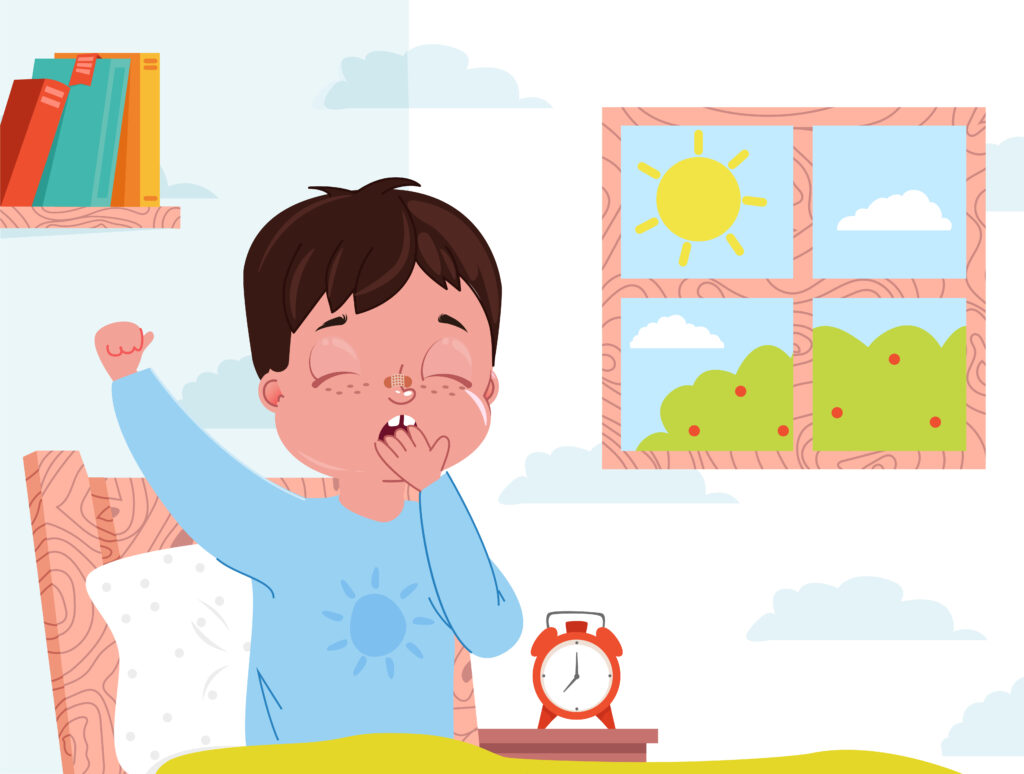Frases en inglés-español para padres y niños. ¿Quién dijo que practicar/hablar inglés era imposible? Aprovecha la rutina de cada día para enseñar a tus hijos una segunda lengua. Toma unas cuantas frases, sino todas y úsalas cada día en casa. En esta ocasión aprendemos vocabulario Inglés/Español relacionado con el momento de levantarse por la mañana y vestirse. Ponlas en práctica, tus hijos te lo agradecerán.
Phrases in English / Spanish for parents and children to put into practice everyday. Who said practicing/speaking English was impossible? Take advantage of the daily routine to teach your children a second language. Take a few phrases, if not all of them, and use them every day at home. In this occasion we learn English/Spanish vocabulary related to morning time and get dressed. Put them into practice, your children will thank you.

| MORNING TIME and GETTING DRESSED | POR LA MAÑANA y VISTIENDONOS |
| – Wakey wakey! Time to get up! | – ¡Hora de levantarse! (modo cariñoso) |
| – Come on sleepyhead! Wake up and get dressed. | – ¡Venga dormilón! Despiértate y vístete. |
| – Hurry up or we will be late for school. | – Date prisa o llegaremos tarde al colegio. |
| – Go and get your backpack. | – Ve a por tu mochila. |
| – Put your coat on, it is freezing outside. | – Ponte el abrigo, hace mucho frío fuera. |
| – We need to wrap up really warm today, because it’s very cold. | – Hay que abrigarse mucho hoy, porque hace mucho frío. |
| – Good morning! How are you today! Let me roll up/down the blind. | – ¡Buenos días! ¡Cómo estás hoy! Déjame subir/bajar la persiana. |
| – Today weather is lovely, help me to drag the curtains. | – Hoy hace muy buen tiempo, ayúdame a correr las cortinas. |
| – Can you make your bed? Do you want me to help you? | – ¿Puedes hacer tu cama? ¿Quieres que te ayude? |
| – Pull the bed sheet tight until there is not a wrinkle left. Finally, tuck it under the mattress. | – Tira de la sábana hasta que no quede ni una arruga. Y por último, remétela debajo del colchón. |
| – Getting dress is “easy peasy lemon squeezy”. | – Vestirse está chupado. |
| – Let me show you how to do it. | – Déjame enseñarte como hacerlo. |
| – Do your trousers zip up/down. | – Sube/baja la cremallera de los pantalones. |
| – Do you buttons up/down. | – Abróchate/desabróchate los botones. |
| – Have you notice that your T-shirt is on backwards? Let me switch it. | – ¿Te has dado cuenta que te has puesto la camiseta al revés (etiqueta delante)? Déjame cambiártela. |
| – Your T-shirt is inside out, turn it right-side out. | – Tienes la camiseta del revés (dentro fuera), dale la vuelta. |
| – The t-shirt label goes on the back. | – La etiqueta de la camiseta va en la espalda. |
| – Trousers pockets go on the back. | – Los bolsillos de los pantalones van en la parte trasera. |
| – Put your shoes on and tie your laces. | – Ponte los zapatos y átate los cordones. |
| – Take off your shoes. Untie the laces. | – Quítate los zapatos. Desátate los cordones. |
| – Fasten your shoe Velcro. | – Abróchate el Velcro de los zapatos. |
| – Unfasten your shoe Velcro. | – Desabróchate el Velcro de los zapatos. |
| – Buckle your shoe buckle. | – Abrocha la hebilla del zapato. |
| – Unbuckle your shoe buckle. | – Desabrocha la hebilla del zapato. |
| – Tie your shoelaces; you are going to trip. | – Átate los cordones, te vas a caer. |
| – Your shoes are on the wrong feet. This one goes on the left and this other one on the right foot. | – Te has puesto los zapatos al revés. Este va en el izquierdo y este otro en el pie derecho. |
| – You are a champ, you have got yourself dressed beautifully. | – Eres una campeona, te has vestido muy bien. |
| – When you arrive to school, don’t forget to put on your school smock, it is hanged on your peg. | – Cuando llegues al cole, no te olvides de ponerte el babi, está colgado en tu gancho/percha. |
| – Can you get your backpack? | – ¿Puedes traer tu mochila? |
| – Can you put your lunch box and your water bottle in your backpack? | – ¿Puedes poner la fiambrera y la botella de agua en tu mochila? |
| – Have a nice day kid. You too dad! | – Que tengas un buen día hijo. ¡Tú también papá! (uno dice, otro contesta) |
| – See you later alligator, in a while crocodile! | – Rima para despedirse. (uno dice, otro contesta) |
| – Wave your hand to the baby. | – Dile adiós al bebe con la mano. |
| – Blow a kiss to your sister, she is going to school. | – Tírale un beso a tu hermana, se va al cole. |